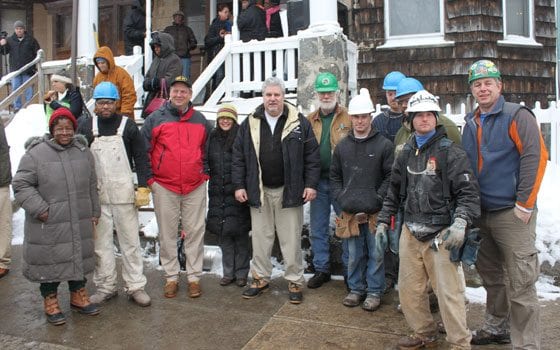Community Voices: ‘No House Left Behind,’ say volunteers in Grove Hall ‘Barnraising’

Betty Maguire has a problem. As a grandmother living on a fixed income, she can hardly afford her winter heating bills.
Help was found in a new city program, Renew Boston, that promised to plug the cracks and insulate the walls in her drafty old three-family home — for free. But when she applied for Renew Boston’s home weatherization program, they rejected her for “pre-existing conditions” — repairs that needed to be done before an insulation crew could come in.
But Maguire is used to solving problems. She’s been a neighborhood activist for 20 years. Over those years she’s built up a lot of friends. Over the past couple of weeks, dozens of those friends have been making her house “weatherization-ready.”
Friends from New England United for Justice cut up her old oil tanks and filled a dumpster with debris from her basement. Apprentices from the Carpenters’ Union poured new concrete, installed sheetrock and doors. “This is part of our Helping Hammers program,” New England Carpenters chief Mark Erlich told a crowd on Ms. Maguire’s porch Jan. 21. “We figure we contributed $5,000 worth of labor and we’re glad to do it.”
Meanwhile, Boston Workers’ Alliance members knocked on neighbors’ doors to tell how they too could save money and energy. “Renters and homeowners need to know how to access the funds to weatherize their homes,” said BWA organizer Hakim Cunningham. “They need education — education creates demand in a community that’s underserved.”
Cunningham said she thinks the utility companies should be investing in the kind of community outreach BWA is doing. “It shows people they’re being helped, not being put through a cookie-cutter marketing strategy. We want to make sure weatherization work reaches individuals who are now underserved.”
And many of those individuals are in the same bind as Maguire, said Loie Hayes of Boston Climate Action Network. According to Hayes, of the first 100 homes Renew Boston audited, 50 percent needed repairs — like Ms. Maguire’s — before they could be weatherized. “Boston is trying to cut its greenhouse gas emissions 80 percent by 2030 to deal with global warming,” said Hayes. “But they can’t do that if they don’t reach 50 percent of our homes.”
The Green Justice Coalition organized and financed the work project at Ms. Maguire’s. Now, say Coalition leaders, the city and state need to pick up the ball. “Betty Maguire isn’t alone,” said Mimi Ramos, executive director of New England United for Justice. “There are thousands of old homes in our neighborhoods that need to be brought up to 21st century building code standards. These repairs can cost them thousands of dollars, money they don’t have. Unless we come together and solve this problem, the people who need weatherization most will be excluded from city and state programs that they are paying for every month. And the city and state won’t meet their climate change goals.”
Mike Prokosch works in the communications department of Community Labor United.






